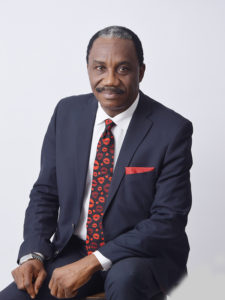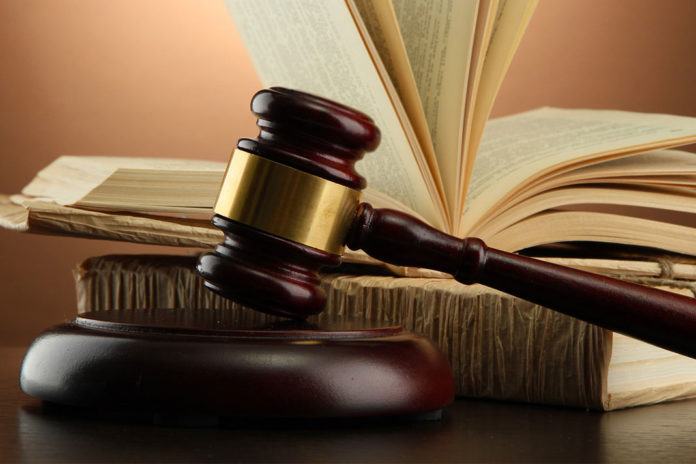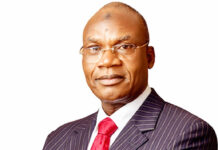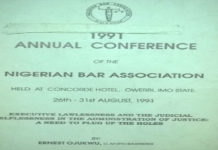Professor Ernest Maduabuchi Ojukwu is the immediate past Deputy Director-General and Head of Campus of the Nigerian Law School, Augustine Nnamani Campus, Agbani Enugu.
 Professor Ernest Ojukwu was conferred with the rank of Senior Advocate of Nigeria at the Supreme Court of Nigeria following his appointment on 12 July 2014 by the Legal Practitioners Privileges Committee, LPPC. He is a Partner at the Law Firm of OFY Lawyers and a Professor of Law at Madonna University.
Professor Ernest Ojukwu was conferred with the rank of Senior Advocate of Nigeria at the Supreme Court of Nigeria following his appointment on 12 July 2014 by the Legal Practitioners Privileges Committee, LPPC. He is a Partner at the Law Firm of OFY Lawyers and a Professor of Law at Madonna University.
In this interview with The Authority Newspapers earlier this year he explained what self recognition means and its wrong use by lawyers and the unlearned.
Do the provisions of the 1999 Constitution supersede the provisions of the Administration of Criminal Justice Act (ACJA), 2015?
Yes it does where there is conflict. The Constitution prevails against any other law where there is conflict.
Sir on the issue of bail, can bail be granted on ‘Self-Recognition’?
Recently, I read newspapers and listened to TV broadcasts which announced that certain defendants on criminal charges were granted bail on ‘self-recognition.’ Almost all our National newspapers said the same thing in the case of bail for former Minister Abba Moro. I took this casually since I know that non-lawyers tend to corrupt “lawyer language” sometimes. However, I became alarmed when I heard some lawyers grant some of those bizarre explanatory TV interviews right out of court, and the lawyers actually used the word or phrase ‘self-recognition.’
This I put on inquiry and embarked on interviewing lawyers myself on their understanding of the phrase, ‘bail on self-recognition.’ Over 55% of lawyers I interviewed actually thought that the phrase ‘self-recognition’ meant ‘self-recognisance’. Three young lawyers actually told me that they were taught ‘self –recognition’ at the Nigerian Law School by the teachers and that it was in fact in the text books they used. I then proceeded to research the text books being used at the Nigerian Law School. I found that none of the three text books used the phrase ‘self-recognition.’ Two actually used the phrase ‘self-recognisance’ while one mentioned the word ‘recognisance’ only once. I put a call to four teachers at the Nigerian Law School and six teachers at different Law Faculties. Six out of the nine teachers thought that the word/phrase ‘self-recognition’ meant ‘self-recognizance.’ So I concluded that our students have actually been taught “self-recognition.”
Otherwise, how come all the newspapers used the same phrase ‘self-recognition?’ I have not looked at any judge’s records to know if any has used this phrase but I have seen lawyers (older lawyers at the bar inclusive) grant their stepping-out-of-court interviews on TV and they used the phrase ‘self-recognition.’ So I concluded that our lawyers are to blame for this ignorance; this misinformation, and misuse of language!
The Administration of Justice Act uses the word ‘recognizance.’ The Criminal Procedure Act uses the word ‘recognizance.’ ‘Recognition’ and ‘Recognisance’ are two English words meaning totally different things. The word ‘recognition’ does not mean ‘recognisance’. ‘Recognition’ means “the act of remembering who somebody is when you see them, or of identifying what something is.” (Oxford Advanced Learner’s Dictionary). The word ‘recognisance’ is “a promise by somebody who is accused of a crime to appear in court on a particular date”(Oxford Advanced Learner’s Dictionary). Black’s Law Dictionary calls ‘recognisance’ “a bond or obligation, made in court by which a person promises to perform some act or observe some condition, such as to appear when called…”
Though the origin of ‘recognisance’ is the old French word “reconnaissance” which earlier derived from ‘reconnaitre’ (recognise), for many centuries the English word ‘recognisance’ has been translated as “engagement” in French and ‘personal recognisance’ as ‘caution personnelle’.
The word ‘self-recognition’ is used in the medical dictionary in two forms. One defines the word itself as “the process by which the immune system of an organism distinguishes between the body’s own chemicals, cells, and tissues and those of foreign organisms or agents”. The other medical usage is associated with the “mirror self-recognition test (MSR). The word or phrase ‘self-recognisance’ is even broken English. The correct English phrase is ‘own recognisance’ or ‘personal recognisance.’
The Black’s Law Dictionary has clearly defined the phrase ‘personal recognisance’ as “the release of a defendant in a criminal case in which the court takes the defendant’s word that he or she will appear for a scheduled matter or when told to appear. This type of release dispenses with the necessity of the person’s posting money or having a surety sign a bond with the court.” Our courts can grant bail on ‘own recognisance’ or ‘personal recognisance’ (not self-recognisance). Our courts cannot grant bail on “self-recognition”













